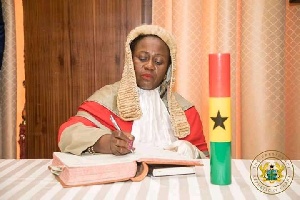- Home - News
- Elections 2024
- News Archive
- Crime & Punishment
- Politics
- Regional
- Editorial
- Health
- Ghanaians Abroad
- Tabloid
- Africa
- Religion
- Photo Archives
- Press Release
General News of Wednesday, 23 April 2025
Source: www.ghanawebbers.com
Chief Justice Gertrude Torkornoo hit with two more removal petitions
The Office of the President has received two new petitions. These petitions seek the removal of Chief Justice Gertrude Araba Esaaba Sackey Torkornoo. This development adds to an ongoing judicial controversy.
With these latest petitions, there are now five against the Chief Justice. The first three were submitted on February 14 and March 17, 2025. The authors of all five petitions remain unnamed.
The contents of the petitions are confidential under Article 146 of the 1992 Constitution. However, sources say they include allegations of misconduct and abuse of power. This situation escalated after President John Dramani Mahama suspended the Chief Justice on April 22, 2025.
The suspension followed a committee's findings that warranted further investigation into the initial three petitions. The President consulted with the Council of State before taking this action, in line with Article 146(6) of the Constitution.
Chief Justice Torkornoo was served with the original petitions and had ten days to respond. She submitted her response on April 7, leading to a decision for a full investigation. With her suspension in effect, Justice Paul Baffoe-Bonnie will act as Chief Justice temporarily.
Public reactions have been swift and divided regarding this suspension and additional petitions. Critics claim the government is pursuing a political agenda to reshape the judiciary for partisan interests. Others argue that constitutional processes should be allowed to proceed without interference.
Former NPP parliamentary candidate Akosua Manu warned that this could lead to "judicial capture." Legal analyst Prof. H. Kwasi Prempeh called for transparency in these proceedings to maintain public confidence in the judiciary.
Currently, Chief Justice Torkornoo remains suspended while a five-member investigative committee is formed to address these issues. The legal and political communities—and the public—are now waiting for developments in this unprecedented process that may change Ghana’s judicial landscape significantly.











